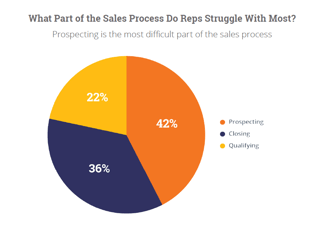 Last week, I reviewed and offered some thoughts on the marketing section of the HubSpot 2015 State of Inbound report. Today, I focus on the sales portion.
Last week, I reviewed and offered some thoughts on the marketing section of the HubSpot 2015 State of Inbound report. Today, I focus on the sales portion.
I’ve mentioned this in the past, and Richard Jackson of Jackson Analytics broached it as well in our chat from a few weeks ago, but in investment management, the lines between sales and marketing are often blurred.
While it is true that sales and marketing are inextricably intertwined disciplines, and understandably so, they are distinct in nature. Each task requires its own independent strategy, but its plan & execution must dovetail with the other.
So, what are the issues preoccupying folks on the sales side this year?
The Report
HubSpot writes,
Our research found that salespeople struggle with a lack of information about their leads and manual data entry -- two challenges that necessarily reduce their effectiveness at converting leads to customers. Just like Marketing’s lead generation is of prime interest to salespeople, marketers would be wise to take the problems sapping Sales’ efficacy to heart.
As I noted last week, the report does not specifically address investment management sales and marketing specifically, but it does consider financial services as a whole, and thus there is specific, actionable intelligence to be garnered from the report.
All of the surveys were conducted in the second half of 2015, so the data is as current as possible (For more about the survey’s methodology, please see last week’s post).
Key Takeaways
The important takeaways from the Sales side of the report are:
- Social selling is still more hype than reality, with only 8% of salespeople surveyed who identify it as a company-wide top sales priority. However, pockets exist where interest is on the rise -- notably among executives.
DQCOMM Takeaway:
For social selling to work as it is intended, salespeople have to know where their key buyer personas are spending their time online, then identifying how best to effectively craft a strategy for engagement. This task is incrediby difficult when iformation is limited (see #4 below). - Sales technology budgets have shrunk year-over-year. In addition, sales departments that have adopted emerging sales tools don’t cite confidence with those tools.
DQCOMM Takeaway:
This is another way of saying, “Old habits die hard.” New technologies designed to streamline any process must first gain the acceptance and trust of the users. Typically this means that while the technology is being implemented, there is a necessary, if temporary, reduction in efficiency.
Salespeople are notorious creatures of habit, and are thus often loathe to accept even a temporary loss of efficiency when what they’ve always done seems to have worked well. This could be a source of the mistrust in the adoption of new tech. - Different roles within the sales team experience different CRM obstacles. While manual data entry is still the biggest CRM problem overall, executives struggle with lack of adoption, and managers decry lack of integration with other tools.
DQCOMM Takeaway:
The importance takeaways here are that: 1). automation of the process should be a priority; and 2). investment management firms need to consider the needs of their sales and marketing teams independently, then shop for solutions which can seamlessly integrate each under one technlogy solution. - Prospecting is the most difficult step of the sales process. This issue is compounded by the fact that salespeople lack vital information before they reach out to leads.
DQCOMM Takeaway: Taking this one step further, 64% of the respondents said prospecting and qualifiying those leads were the top concern:
Here is where Inbound Marketing can greatly help sales teams to pre-qualify leads. When the sales team knows the content in which a prospect has shown interest, as well as the ways in which he/she has engaged that content, it offers important and plentiful insights into their motivation, needs, and (by extension) problems, and concerns.
- “Field sales” isn’t really dying. Despite sensational articles declaring its demise, hiring data shows that outside reps are getting hired (and fired) at more or less the same rate as inside reps.
DQCOMM takeaway: As I’ve written before, merging (rather than replacing) new strategies and technologies, such as Inbound Marketing for investment management firms, with established practices is often the correct strategy for investment management marketers. - Executive buyers are not very trusting of salespeople. To regain credibility among executives, salespeople should arm themselves with content and become active on social networks.
DQCOMM Takeaway: Marketing has become a ubiquitous presence in our day-to-day lives, and most of us have developed a reflex against being marketed to and sold to.
That’s why Inbound Marketing for investment managers, with its focus on creating content that is genuinely helpful to the core buyer personas is the best, most effective ways of building and earning trust, as it is a process that plays itself out over the long-term.
Summing up
The most important thing for those in the investment management and asset management industry to know is that Inbound Marketing is not a fly-by-night strategy that will be easily replaced.
It is the long-term direction of the industry, and merging Inbound with your firm’s existing strategy is a sure-fire way to better position your firm for long-term success.
The full State of Inbound 2015 is definitely worth a full read (and can be downloaded here).



